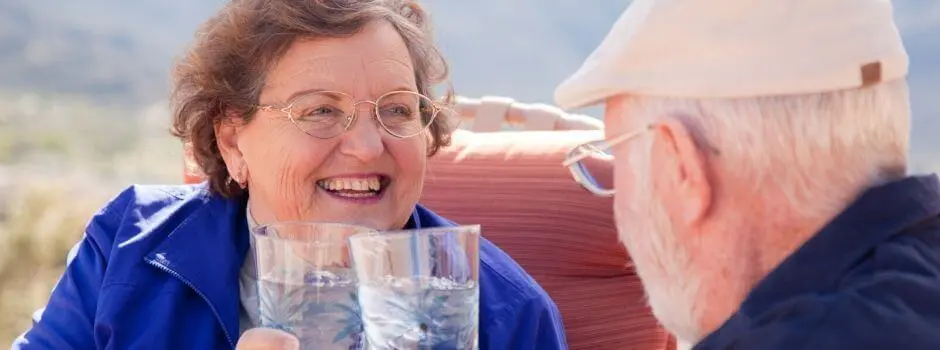Dehydration can lead to serious health complications for seniors, especially during the summer. As the temperatures get warmer, it’s a good time to check in with the older adults in your life to be sure they’re drinking enough water. Read on for tips on preventing dehydration and what to look for in those you love.
“By composition, our bodies are close to 60% water. Staying hydrated is important for so many of our mental and physical functions,” explains Dr. Mark Learned, InnovAge’s medical director for
Colorado.
“Between 20 and 30% of older adults are chronically dehydrated. Medications such as diuretics, laxatives, and sedatives often used by seniors can contribute to dehydration. They are also more likely to become sick and need medical attention if they do get dehydrated.”
Here are some tips to help your older loved one stay hydrated during the summer and throughout the year:
- Encourage them to drink small amounts of water throughout the day; using a straw can make it easier.
- Have them keep a water bottle with them. “You can order bottles or mugs with personal pictures on them, like children, grandchildren, or pets,” says Dr. Learned.
- Set an alarm to remind them to drink.
- Encourage water before and after every meal.
- Try adding some flavor like fruit infused water, and remember that fruits and vegetables are made up of mostly water!
As a caregiver, here are some warning signs to look for that may indicate your loved one is dehydrated:
- Dry mouth
- Constipation
- Headache, dizziness, confusion
- Urine that is amber or dark in color
- Infrequent urination
- Weakness, lethargy
“In more advanced cases,” Dr. Learned says, “a person will stop sweating, stop urinating, and their blood pressure will drop lower than usual. Disorientation can develop and if severe, the person can pass out.”
InnovAge care team members work with participants in the
Program of All-inclusive Care for the Elderly (PACE) and their caregivers to provide education on the benefits of hydration and encouraging water intake while seniors are at the centers. “Staff also provide nutritional evaluations and consultations and we check kidney function and electrolytes at every 6 month medical clinic visit,” explains Dr. Learned.
